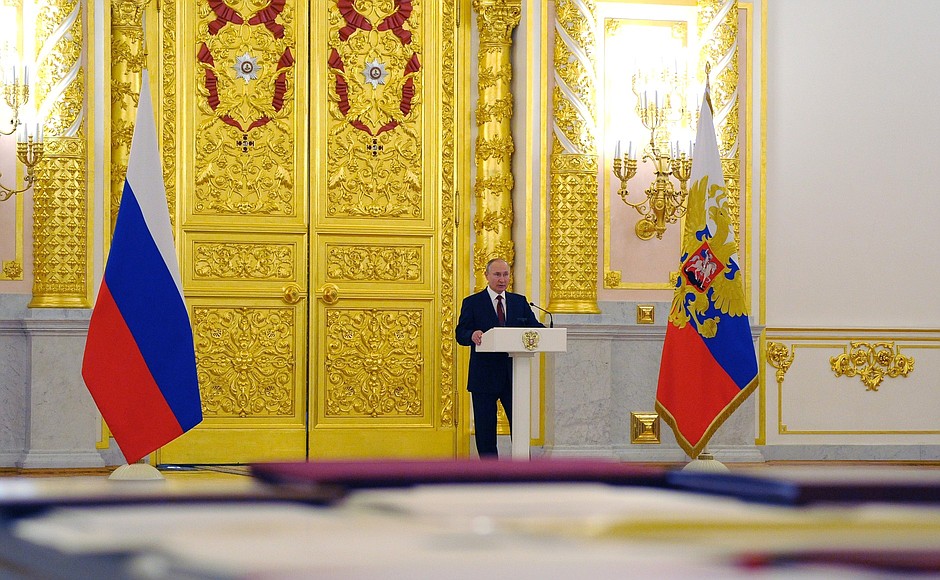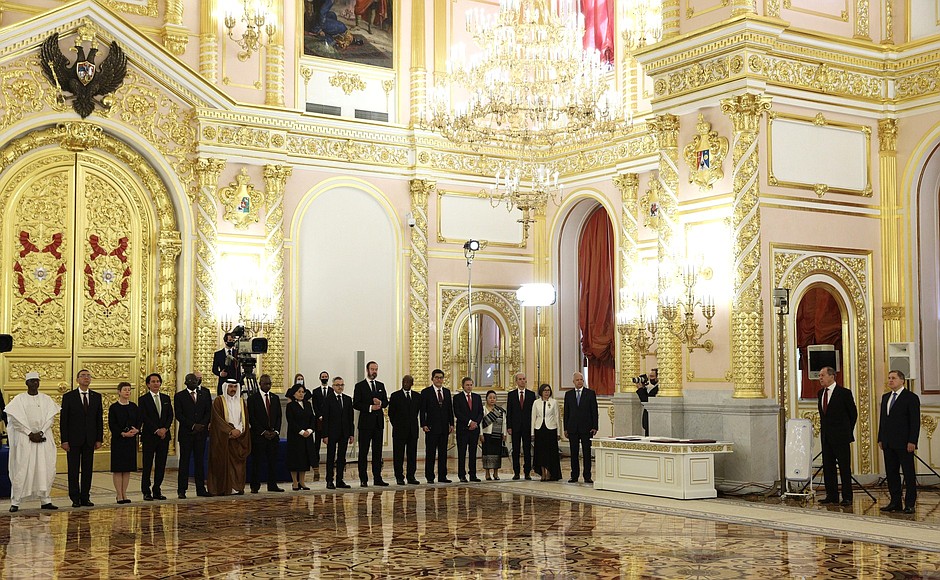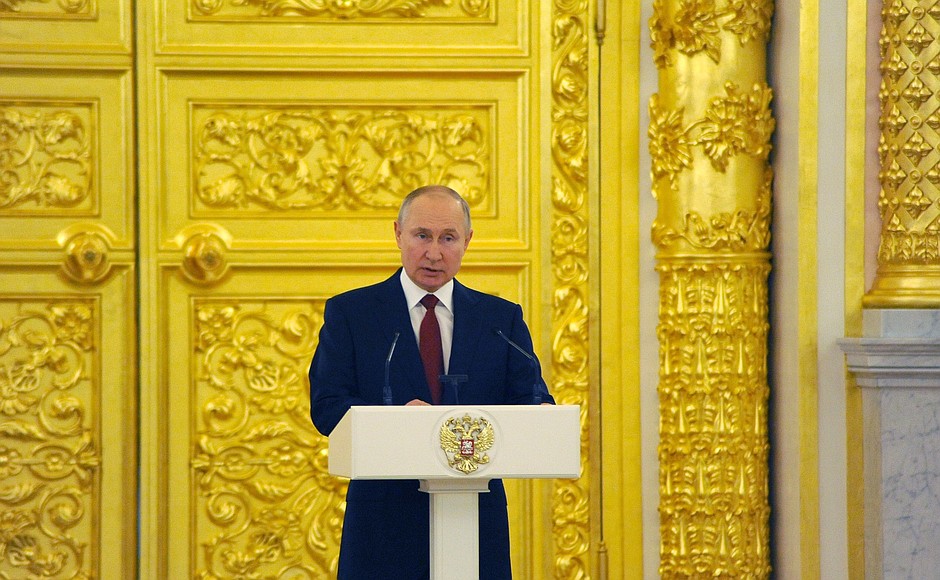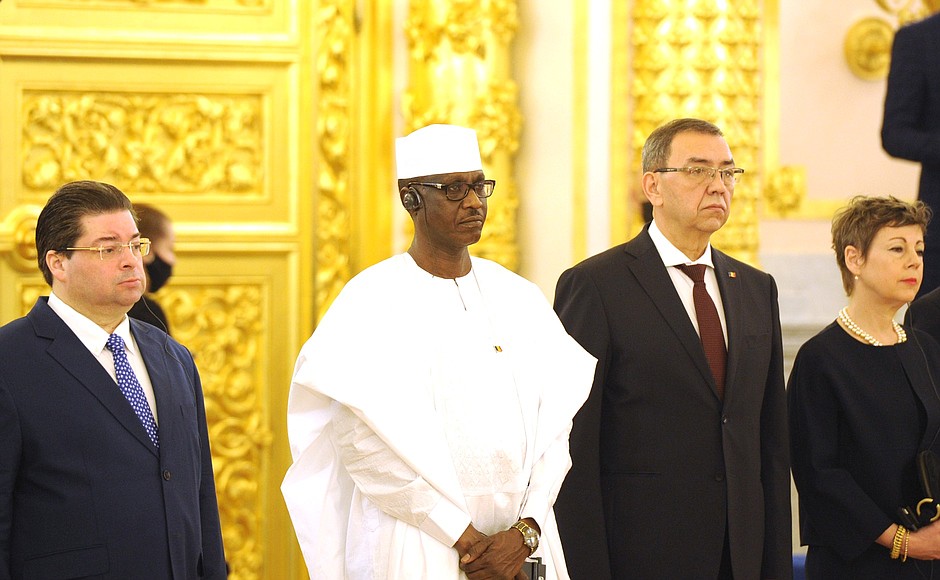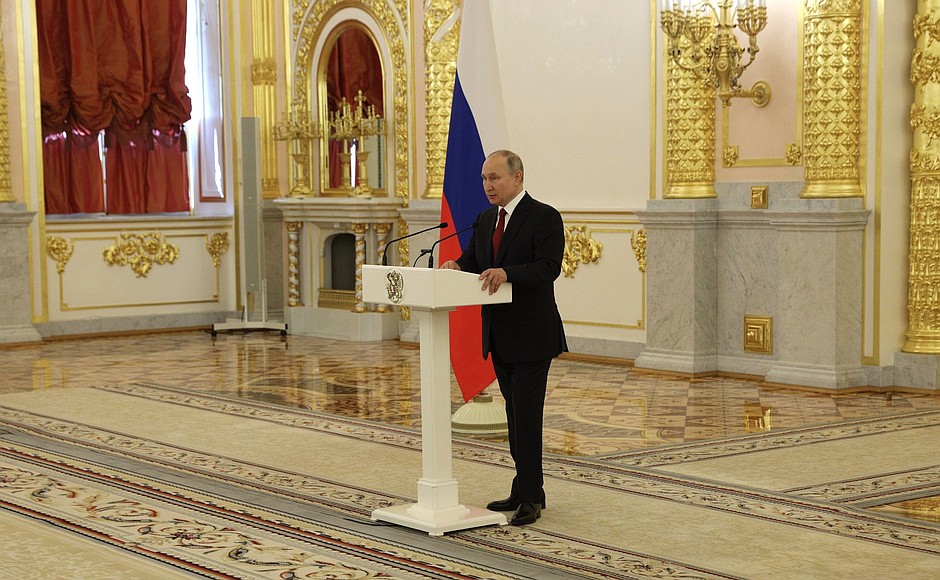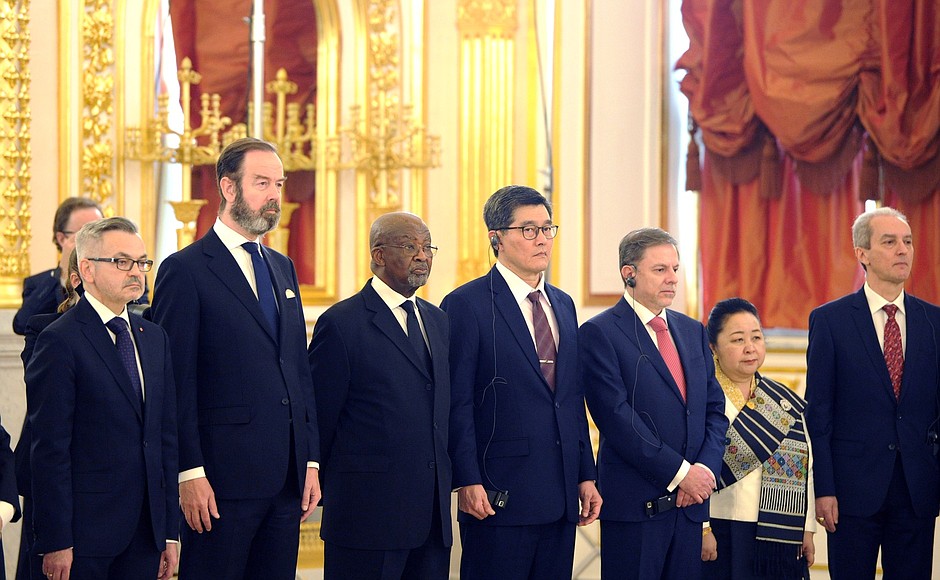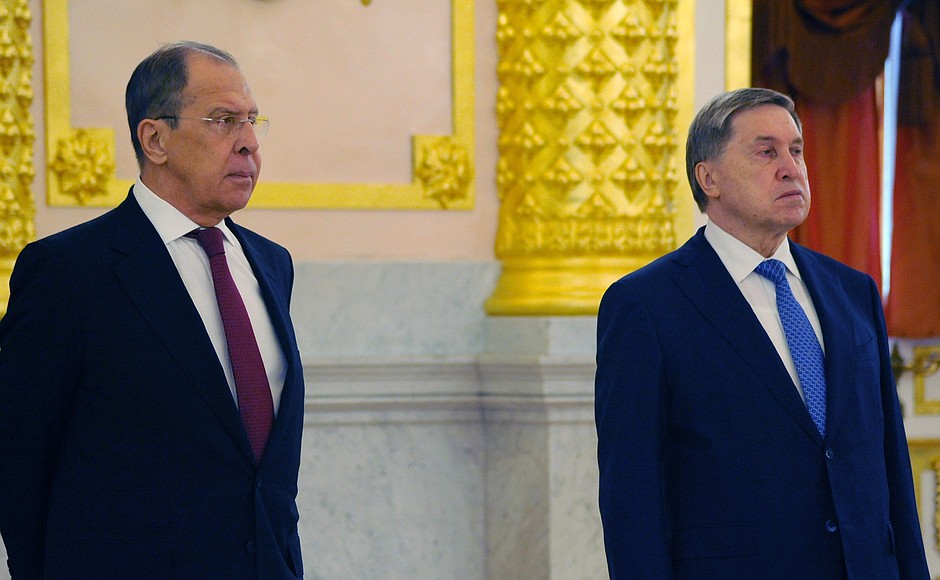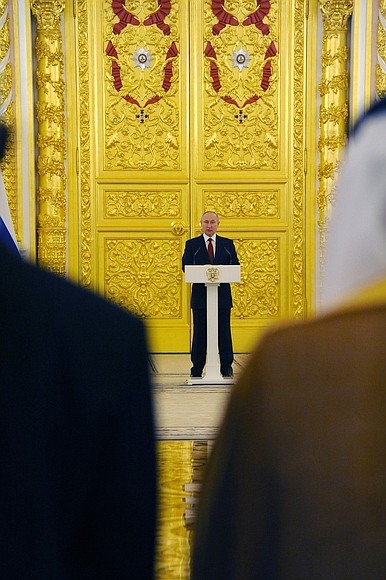Letters of credence were presented to the President of Russia by Zeljko Samardzija (Bosnia and Herzegovina), Khaled Shawabkeh (Hashemite Kingdom of Jordan), Jose Mateus Muaria Katupha (Republic of Mozambique), Jose Antonio Morato Tavares (Republic of Indonesia), Dr Khesvar Jankee (Republic of Mauritius), Hans Dannenberg Castellanos (Dominican Republic), Mahamoud Adam Bechir (Republic of Chad), Vladimir Golovatiuc (Republic of Moldova), Krystyna Marty Lang (Swiss Confederation), Said Tayeb Jawad (Islamic Republic of Afghanistan), Alfredo Cristovao Gomes Lopes (Republic of Guinea-Bissau),Sheikh Ahmed bin Nasser bin Jassim Al Thani (State of Qatar), Benson H.O. Ogutu (Republic of Kenya), Gulnara-Klara Samat (Kyrgyz Republic), Krzysztof Adam Krajewski (Republic of Poland), Gilles Arnout Beschoor Plug (Kingdom of the Netherlands), Mzuvukile Jeff Maqetuka (Republic of South Africa), Sasiwat Wongsinsawat (Kingdom of Thailand), Eduardo Antonio Zuain (Argentine Republic), Vilavan Yiaporher (Lao People's Democratic Republic), Cristian Istrate (Romania), María Luisa Ramos Urzagaste (Plurinational State of Bolivia), and Eduardo Escobar Marin (Republic of Chile).
* * *
Speech at the ceremony to present ambassadors’ letters of credence
President of Russia Vladimir Putin: Good afternoon, ladies and gentlemen.
I am happy to welcome you here at this ceremony to present your credentials.
Given that the epidemiological situation is still complicated, this event is being held with certain protocol restrictions and adjustments. I think you understand the importance of the format of today’s meeting. But what is most important is that we are meeting at the Kremlin and I can personally congratulate you on officially commencing your diplomatic activities here in the Russian Federation.
You have an important and serious task: to promote the strengthening of multifaceted cooperation between the states you represent and Russia, as well as to develop fruitful contacts in the political, trade, economic, cultural, humanitarian and other areas.
You can always count on the support and assistance of the Russian authorities, our ministries and agencies, and, I am sure, of public organisations, as well as on the friendly attitude and sincere interest of business and political circles in the implementation of joint projects and initiatives.
Russia is open to mutually beneficial partnership. We are ready to work together with all states without exception on the basis of equality, respect for each other’s interests and non-interference in internal affairs. We have consistently advocated the establishment of equal and indivisible security, honest and fair economic cooperation free from unfair competition and politically motivated sanctions and restrictions.
This was the main, fundamental message of the international part of my Address to the Federal Assembly of the Russian Federation, which I delivered to our deputies in April this year.
Regrettably, the international situation remains unstable and is even becoming more complicated. We see that this concerns not only the coronavirus pandemic, which has greatly damaged all of us, claiming millions of lives and provoking deep changes in all spheres of our activity.
We are no less concerned about the deterioration of the system of strategic stability and arms control. Terrorism is rearing its ugly head once again, problems are growing in the sphere of international information security, and the risks of drug trafficking and organised crime remain critically high.
Decades-old regional conflicts are becoming aggravated in Afghanistan and Libya, and in the past few days we saw a dramatic escalation in the Middle East, which we all are well aware of and are monitoring with great concern. The flare-up of confrontation between the Palestinians and Israelis has already resulted in numerous civilian casualties, including children.
We consider it imperative for both sides to end the violence and to begin looking energetically for a solution based, of course, on the relevant resolutions of the UN Security Council and generally recognised principles of international law.
Russia, as a permanent member of the UN Security Council, has been trying to contribute to the settlement of acute crises and other immediate international concerns.
We have done a lot to normalise the situation in Syria, and we are helping launch peaceful political dialogue in that country. Russia’s mediatory efforts have stopped hostilities in the Nagorno Karabakh conflict zone, a complete ceasefire has been achieved, and the process of reconciliation and the return of refugees is underway.
Going back to the subject of the coronavirus, I would like to note that Russia is interested in cooperating with foreign partners regarding the global COVID-19 response effort. We have managed to quickly develop three effective national COVID-19 vaccines. The fourth vaccine will be available soon, and the vaccination campaign is picking up momentum.
The epidemic has proved a real test for such universal human values as solidarity, mutual assistance, and love for humanity. This country provides targeted assistance to over 60 states on all continents. We share our experience and help launch production of Russian medications at foreign enterprises. By the way, no one else, except Russia, is doing this for the time being. We have teamed up with other countries to overcome the long-term economic and social consequences of the pandemic.
I repeat once again: It is possible to ensure peace, stability and sustainable global development only through the efforts of the entire international community. We are calling for well-coordinated work by states, permanent members of the UN Security Council and all concerned countries. As you know, Russia has recently celebrated the anniversary of Victory in the Great Patriotic War that started 80 years ago, on June 22, 1941, when the Nazis treacherously attacked our Motherland.
We cherish the memory of those who fought in the war, who gave their lives for peace and freedom, who selflessly worked at the Home Front, and we honour our veterans.
We are convinced that everything must be done to prevent the tragedy of World War II from repeating itself, so that its lessons will not be forgotten. All of us must cherish the priceless experience and spirit of allied relations during the struggle against common challenges and threats. We must remember the consequences of policies pandering to nationalism and xenophobia, and we must jointly elaborate a positive and unifying agenda to forge a more equitable and democratic multipolar world order. We must ensure the well-being and prosperity of all human beings.
Ladies and gentlemen,
Heads of 23 diplomatic missions are attending today’s ceremony. I will take the liberty to describe in brief the state of relations between Russia and each of the countries you represent.
Relations with Bosnia and Herzegovina occupy an important place in Russia’s policy in the Balkans. We are committed to actively promoting our bilateral contacts in trade, the economy, culture and the humanitarian sphere. As a guarantor of the Peace Treaty entered into 25 years ago, Russia stands for an undeviating observance of the principles enshrined in the Dayton Accords with respect to the sovereignty and territorial integrity of your country. We see it as an inseparable condition for building a genuinely modern and democratic Bosnia and Herzegovina.
Russia and the Hashemite Kingdom of Jordan maintain a multifaceted political dialogue, including at the top level, on topical international issues. Our positions are close or largely coincide, primarily on questions related to a Middle East settlement. I will also mention that Russia and Jordan have a good potential for expanding bilateral interaction in the economy, power engineering, military technology and other areas.
The Republic of Mozambique is our time-tested partner on the African continent. We have mutual interest in further building up contacts in the political field and strengthening cooperation in such areas as energy, hydrocarbons production and chemical fertiliser production.
Last year we marked the 70th anniversary of diplomatic relations with the Republic of Indonesia, with which Russia has friendly ties. We can see the prospects for implementing new joint projects in nuclear energy and hydropower engineering, in developing transport and urban infrastructures as well as in aircraft building and shipbuilding. It is important that our countries seek to coordinate our positions on pressing issues on the global and regional agendas. We work together at various dialogue platforms in the Asia-Pacific region, including in the Russia-ASEAN format.
Our relations with the Republic of Mauritius have traditionally been partner-like and based on mutual respect. There is room for deepening our trade and economic interaction and for boosting our cooperation in the fields of marine and air transport, fisheries and tourism.
We intend to continue developing cooperation with the Dominican Republic, in tourism, among other areas. We have no doubt that your authorities will settle the difficult epidemiological problems facing them, and that Russian tourists will return to Dominican resorts. In general, more energetic humanitarian exchanges will be promoted by the intergovernmental agreement on visa-free travel signed in December last year.
The strengthening of Russia’s political and economic ties with the Republic of Chad will be in the interests of both countries. Russian companies are supplying machinery, equipment and other industrial products necessary for the economic modernisation of Chad. We will continue to provide assistance to your country within the framework of the UN World Food Programme and to train national personnel for you, including for your armed forces.
Our approach to relations with the Republic of Moldova is based on traditions of friendship and common spiritual values, which our nations share. This year will mark the 20th anniversary of the fundamental bilateral Treaty of Friendship and Cooperation. We will continue to promote the search for a fair solution to the Transnistrian problem and an agreement on a special, reliably guaranteed status for Transnistria based on respect for the sovereignty and territorial integrity of Moldova.
Relations between Russia and the Swiss Confederation, which go back 200 years, have always been based on the principles of mutual respect and mutual advantage and are being developed in the best interests of both sides. We maintain an active political dialogue, are promoting multifaceted industry-specific contacts and highly appreciate Switzerland’s neutral status and its role as an intermediary in the settlement of international conflicts and disputes.
The peaceful development of Afghanistan plays a key role in ensuring security and stability in Central and South Asia. Russia will continue facilitating the establishment of an independent, economically self-sufficient Afghan state, free of terrorism and drug-related crime. We will continue to support direct intra-Afghan talks on national reconciliation, including through the Shanghai Cooperation Organisation.
In order to further develop friendly ties with the Republic of Guinea-Bissau, we are open to a joint search for promising and mutually beneficial areas of cooperation and joint projects. We intend to continue working to boost bilateral contacts in trade, the economy, investment and culture and coordination in international and regional affairs, including the strengthening of peace and security on the African continent.
Our agenda of interaction with the State of Qatar is quite rich. It includes promoting investment partnerships and joint efforts to reveal the potential of cooperation in trade and the economy. A representative Qatari delegation will take part in the St Petersburg International Economic Forum on June 2–5. I have a very good relationship with Emir Tamim bin Hamad al-Thani. The Emir has been invited to visit Russia, and we will implement this plan. I would also like to note that Russia is closely cooperating with Qatar on the organisation and holding of the 2022 FIFA World Cup.
A constructive partnership has been established with the Republic of Kenya. Both our countries are interested in promoting bilateral political, trade, economic and cultural cooperation. We will do everything in our power to promote this agenda and will continue to train Kenyan students at Russian universities.
Our relations of strategic partnership with Kyrgyzstan have been growing stronger. Our countries are united by the pages of our common history and we have mutual trust and respect for each other. Russia and the Kyrgyz Republic successfully interact in the trade, economic, military-technical, cultural, humanitarian and other areas. Together we are facilitating the development of Eurasian integration. We will hold talks on all these issues during the upcoming meeting with President Sadyr Japarov on May 24 in Sochi.
Russian-Polish ties could certainly be more meaningful and productive, especially since we are neighbours in the Baltic region. The complex problems that have accumulated in bilateral relations can certainly be resolved by acting with pragmatism and taking each other’s interests into account. We support this kind of constructive approach.
The Kingdom of the Netherlands is one of our largest trade and economic partners. We welcome the Dutch business community’s interest in expanding business ties with Russia. We would like this attitude towards mutually beneficial cooperation to be extended to the political sphere. We stand for dialogue and equal interaction.
The partnership between Russia and the South African Republic dates back to the days of their struggle against apartheid and has now reached a truly strategic level. We are working closely within BRICS to strengthen the association’s role in global affairs. We effectively coordinate our actions on other international platforms, including the UN and the G20. In the spirit of friendship and mutual respect, we are ready to deepen bilateral ties in trade, the economy and investment in the future.
Our relations with the Kingdom of Thailand have gained momentum. Contacts are developing between the two countries’ security councils and defence departments. There are arrangements for mutual port calls by warships, and mutually beneficial projects are being worked on in the military-technical field.
Russia and Thailand have also accumulated rich experience in economic cooperation, which is essential for expanding and diversifying trade and investment cooperation. We need to encourage joint initiatives between our business communities and certainly deepen humanitarian ties and stimulate tourism.
We attach great importance to our strategic partnership with Argentina. We maintain good relations with President Alberto Fernández. We appreciate his commitment to effective mutual coordination in the political sphere, as well as to a further build-up of economic ties. Argentina was the first Latin American country to register and roll out the Russian Sputnik V vaccine. Regular supplies have been established to continue vaccinating Argentine citizens. The possibility of starting local production of Sputnik V in Argentina is under discussion.
We are satisfied with the level of our cooperation with Laos, Russia’s reliable partner in Southeast Asia. We support the efforts aimed at expanding our cooperation in trade, the economy and humanitarian affairs. We will continue to provide military and technical assistance to the Lao People’s Armed Forces and to train Lao military personnel at Russian Defence Ministry’s higher education institutions. We closely cooperate with our Lao partners at the United Nations and in other international formats where our countries have close and often common positions.
We rely on the development of mutually beneficial relations with Romania. We are ready to work together on intensifying political, economic and humanitarian links. There is good cooperation potential with respect to the Black Sea region.
We are strengthening cooperation with the Plurinational State of Bolivia, one of our priority partners in Latin America. I am convinced Russian−Bolivian links will continue to expand, especially in such promising areas as energy, mining and the peaceful use of nuclear technology.
We have a constructive relationship with Chile, which is indicated by both bilateral contacts and our joint work at multilateral platforms, including the Asia-Pacific Economic Cooperation Leaders’ Meeting. We are interested in further developing trade and investment cooperation on the basis of equality and mutual benefit.
Ladies and gentlemen,
Once again, congratulations on the official start of your ambassadorship. I would like to wish you success, good health, which is always important and these days, in particular, and all the very best.
I hope that your work will facilitate the strengthening of friendship and mutual understanding between our countries in every possible way. I have no doubt that during your diplomatic work in Russia, you will have an opportunity to learn about different aspects of life in this country, our rich culture, history, traditions and customs, and, of course, enjoy the sincere hospitality of Russia’s multi-ethnic nation.
Thank you and congratulations on the beginning of your official missions.
Thank you. I wish you every success.
Good bye.
